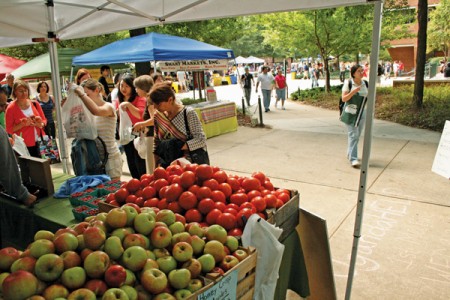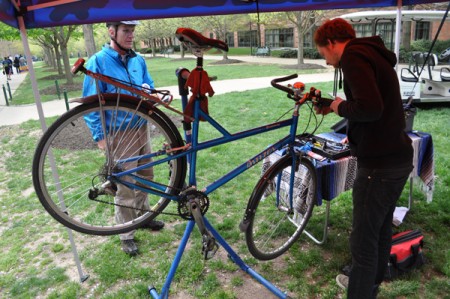By Jeffrey Giorgi / Asst. News Editor

While the farmer’s market is not currently going to appear at Mason, there is a possibilty that it will return in the future. File photo
On Earth Day 2009, amidst blue skies, rain and even hail, the farmers market made its debut at George Mason University. Students and faculty were able to buy organic fruits, vegetables and various all-natural foods. Since then, the market has moved around campus, but now, they may be without a home for the future.
“We were only active for about a month before the students left,” said Jean Janssen, president of Smart Markets Inc. of the farmers market’s first appearance at Mason. “They put us in Lot K for the summer where we did very, very poorly. We didn’t have any way of letting the community know we were there because they wouldn’t let us put any signs up.”
For Mark Kraner, executive director of retail operations at Mason, the handling of the farmers market was a matter of logistics.
“One of the things we asked was for it to be focused toward the people on our campus. Trying to bring more bodies onto our campus that are not a part of [the Mason community] is not always the best thing to do,” Kraner said. “We weren’t trying to get the neighborhood to come in, especially since there are two farmers markets in Fairfax.”
Many of the vendors were hesitant to come back after the initial outing because of poor profits. But in fall 2009, the farmers market reappeared on the North Plaza, a spot that, while better, still had problems.
“Almost every week when we arrived, there was something set up,” Janssen said. “We weren’t plugged into the life of the university enough to know what was happening in the plaza.”
The market left Mason in October 2009 after a successful and stressful two months.
“Everyone could see the potential to do well,” Janssen said. “It was just a matter of managing it. Those two months all the vendors could see a potential profit.”
The market was supposed to reappear in spring 2010 but more issues arose and the re-opening was delayed.
“We decided not to open until last fall and then it would be a year-round market,” Janssen said.
So the market made its return, this time just outside of Southside. With a plan to remain on campus year round, things looked bright for the future of the market.
“We came to an agreement and came up with a space-use agreement for this year,” Kraner said. “[Janssen’s] request was thatthey not be located on the plaza and we worked out a space for it, and it was by Southside. It was a mutual agreement as to location. She chose the day and time which she thought would be best.”
However, what looked good on paper did not pan out, and a drop in profits ultimately caused the market to close again.
“We just didn’t get the foot traffic,” Janssen said. “On this campus you don’t have students crossing through large parts of the campus throughout the day. They park and go straight to their classes, and foot traffic was so bad that all our vendors dropped out.”
Janssen added that the process was part of the problem.
“If we were a part of the university where we worked with a committee, or a working group, we would be hearing the voices that tell us that location is a bad idea,” Janssen said.
Only speaking with one part of a community can make planning difficult and a lack of community can create problems where there might not otherwise be any if multiple factions were involved, Janssen said.
“That is why I’ve always felt we lost the opportunity to do on this campus what other markets are doing on other college campuses,” Janssen said.
On Thursday at 1 p.m. a meeting will be held to discuss the farmer’s market at Mason.
“We’re going to be looking at the market in general,” said Dan Waxman, professional and alumni development manager. “Things like a desire to have a market here on campus and if the community will want it because there is an express interest from people on campus.”
Whether the farmers market will return remains undetermined.
“Why [Janssen] hasn’t come back this spring, I’ll be honest,” Kraner said. “I have sent her a letter asking when she’s going to return and she has not replied so I can’t answer the question, because she hasn’t communicated that to me.”
The Prince William campus hosts a successful farmers market on Thursdays. Prince William focuses on attracting the surrounding communities, and Mason focuses solely on drawing its students and staff.
“When you think about it logically, it may not be the best thing for a farmers market,” Kraner said. “That’s what we think is happening, but we don’t know for a fact.”
But according to Janssen, the potential for return still remains, under the right circumstances.
“We wouldn’t try to come back in the summer unless … you actually get the Skins here,” Janssen said. “And if the traffic circle is no longer in need of construction … I don’t see why we can’t just set up for three hours a day.”
Some feel the market has provided the opportunity for students to have a healthier diet and to help the community.
“Our farmers market has provided a great addition for university life here at Mason and served as another resource for learning about the planet and the value of food,” Waxman said.
